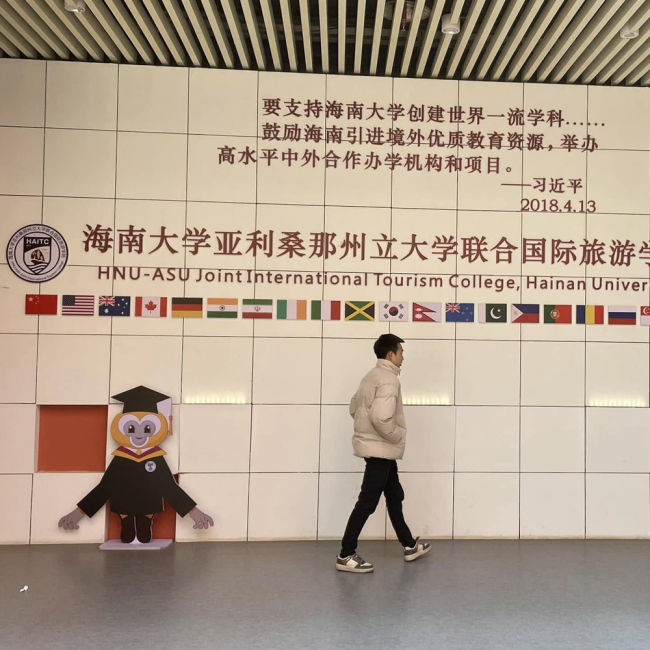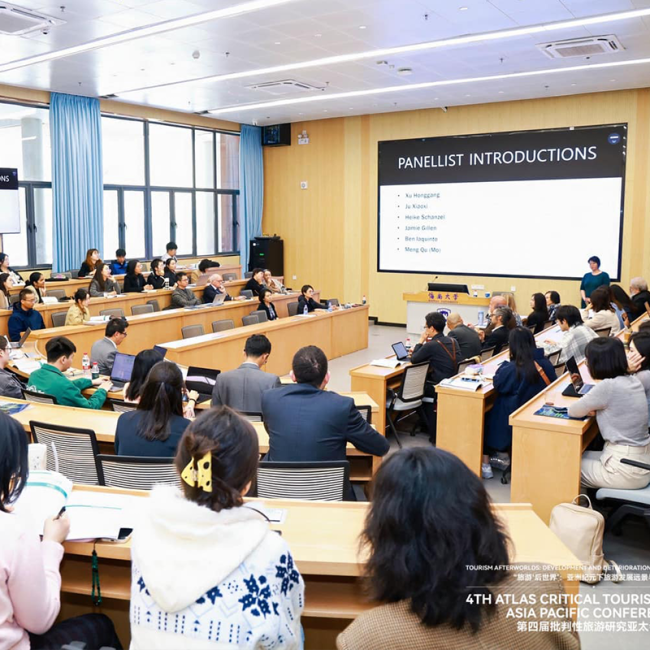Research on tourists in the digital age presented in China
2025-03-27Richard Ek and Mekonnen Tesfahuney, both professors in human geography at Karlstad University, recently finished a paper called “Sloterdijk, Geomedia, and the Existential Tourist”. Richard Ek presented the paper at a conference in China.
Richard Ek, tell us about your paper “Sloterdijk, Geomedia, and the Existential Tourist”
– It’s a philosophical paper which will be published in “Tourism, Culture and Communication”, where Mekonnen Tesfahuney and I reflect on tourists in the digital age. Media and digital technology are so pervasive today and so close to our bodies that they have become like an external “shell” through which we navigate the world. At the same time, this technology is part of an increasingly feudal-like capitalism where we more or less unconsciously work for free for Meta and other large tech companies (which are increasingly intertwined with the American president). Sloterdijk has written about this geomedia environment from an existential perspective, and we try to figure out ways to escape these digital bubbles – or the digital sphere altogether. Philosophically, it can be seen as an act of resistance – such as “digital detox” and other digital disconnection practices.
What is the level of interest in geomedia in China?
–The paper was presented at a tourism conference in Hainan, and my participation was enabled with support from the Centre for Geomedia Studies. Hainan is located in the South China Sea with a lot of tourism, and the connection between tourism and geomedia has always been strong. As a result, there is a high level of interest in geomedia in this part of China. My impression is that the Chinese are more digitally connected and spend more time in front of the screen than Europeans, and that technology in general is further along there – especially when it comes to payment technologies. On the other hand, all this technology is controlled by an authoritarian regime, so geomedia technology in China is like a parallel digital world compared to the dominant geomedia companies in the Western world.
How was “Sloterdijk, Geomedia, and the Existential Tourist” received at the conference?
–It was well received, although the presentation might have been too philosophical for some researchers. However, many of the attendees, especially the students, were curious. In China, master’s students must present their theses at international research conferences and therefore there are many students attending conferences compared to Europe.
Tell us about your upcoming collaboration in India
– I visited Flame University because a research acquaintance from my time at Lund University now works there. It is a private university, established just 10 years ago, that is looking to gain more prestige in the academic world. International contacts are therefore important to them. Discussions about future collaborations have just begun, but they are, for example, open to welcoming visiting researchers. As a first step, my former colleague and I will write a paper on “necropolitics” – a survey paper where we will look at how this dramatic concept has been used in the social sciences and how the understanding of the concept varies between the Global North and the Global South.
What was your lecture in India about and what was the response?
–My lecture, “The idea of state power, the public, and policy in the neoliberal world”, was a broad introduction to political philosophy aimed to interest students from various courses in sociology, political science, business administration and social work. It also included an empirical study into what is happening in Sápmi, where the increasing interest in extracting metals and other natural resources is particularly reducing and restricting the Sami people’s livelihood opportunities and political rights. This Arctic part of the Nordic region is a fascinating area for many people in Asia (as seen by the many tourists from Asia visiting northern Sweden), so this empirical example received a lot of attention.
–I believe it’s important for researchers in Sweden to become more familiar with the major research nations in Asia, such as India and China. There are numerous indications that the geopolitical balance is increasingly shifting in favour of Asia, and the growing international research taking place there is part of this subtle geopolitical shift in power.






